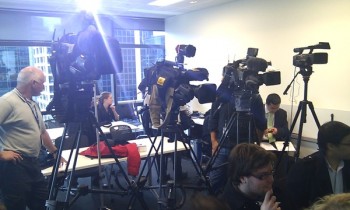My week of Monday 1 to Sunday 7 February 2021 was exactly as described in the headline, plus some rainy weather — but not as rainy as some previous weeks.
Continue reading “Weekly Wrap 558: Hosing down a silly idea, starting another Pozible campaign, and more nostalgia”Senate to re-open Bloggers versus Journalists
 That tired “bloggers are not journalists” debate looks like it’ll surface in Australia’s Senate soon, thanks to The Greens. It’ll be annoying. But it’ll be a Good Thing.
That tired “bloggers are not journalists” debate looks like it’ll surface in Australia’s Senate soon, thanks to The Greens. It’ll be annoying. But it’ll be a Good Thing.
At the end of October the House of Representatives passed the Evidence Amendment (Journalists’ Privilege) Bill 2010, which is all about protecting the confidentiality of journalists’ sources. In the usual jargon, it’s a “journalist shield law”.
Australia was apparently the only major democracy without such a law in place or in progress, so it’s welcome. And, in the words of the new Greens MP for Melbourne, Adam Bandt, “this bill is a good example of how all parties can collaborate on a worthwhile initiative in a way that would not have happened without the currently composed parliament.”
Bandt continued:
To facilitate its passage, the Greens will support the bill in its current form in the House, but I indicate now that we will seek minor amendments to it in the Senate. In particular, we believe that it should be made explicit that the bill covers bloggers, citizen journalists and documentary filmmakers, and that the privileges provided by the bill cover anyone engaged in the process of journalism, no matter who they are or in what medium they publish.
Well I reckon it’s great that the new law might cover more people, not just those who work as employee-journalists in the industrial media factories. It’s great that it might be technology- and medium-neutral. But…
What the heck is a “blogger” or a “citizen journalist”?
Continue reading “Senate to re-open Bloggers versus Journalists”
So why don’t you vote for The Greens?
The estimable Possum Comitatus has asked this very question over at Crikey Blogs.
I’ve already added my two bits, mostly referring back to my post Why The Greens won’t win Marrickville from 2007.
Interview with Senator Scott Ludlam
On Friday I recorded an interview with The Greens’ Senator Scott Ludlam about the leaking of a “secret” Internet censorship blacklist. A few quotes were used in my Crikey piece. Here’s the full audio, just under 5 minutes.
Ludlam reckons Conroy should dump the filter trials and ask the industry for advice. After all, there’s 20 years of Internet expertise out there.
“Ask the question of the online community and the child protection community more generally ‘What’s the best way to protect children online?’, whether it’s from being poached in chatrooms, coming across [adult] material, or falling victim to some of the syndicates that are out there — all of the areas which net filtering won’t even go close to touching,” he said.
Senator Stephen Conroy’s office has reminded me that there is a consultative committee. Still, it does seem backwards to be trialling a specific technical solution before it’s been determined that it’s an appropriate place to be spending the money.
Podcast: Play in new window | Download (Duration: 5:03 — 5.8MB)
This is released under a Creative Commons Attribution-NonCommercial-ShareAlike 2.5 Australia Licence. You may reproduce, distribute and remix this work, as long as it is for non-commercial purposes, you credit Stilgherrian, and you licence any derivative the same way. Please contact me for any commercial usage.
Dear Mr Albanese, Internet censorship trials must stop
Here’s my letter to my federal MP Anthony Albanese (pictured), which this very moment is rolling off his fax machine.
I’m hoping that Mr Albanese will be able to have some impact on this because he is both Minister for Infrastructure — the Internet is key infrastructure, right? — and Leader of the House of Representatives.
I know that he understands human rights issues because … well, us Marrickville folks just do understand these things, right Anthony? And you certainly knew how to stick it into John Howard when he demonstrated cluelessness.
Like Mark Newton, I also release this letter into the public domain.
Continue reading “Dear Mr Albanese, Internet censorship trials must stop”
Greens to support computer games industry
Today The Greens are launching a policy to support the computer games industry in Australia.
There was a story earlier this year that the gaming industry is now bigger than the film industry. That’s only true if you compare the whole gaming industry with just film box-office sales and ignore DVD sales and rentals, exports and other non-cinema income. Still, it does make a point: gaming is a lot bigger than most people realise.
The gaming industry wants the same tax breaks as the film industry. I figure that to be consistent, yes, either they both get these breaks or they both don’t.



